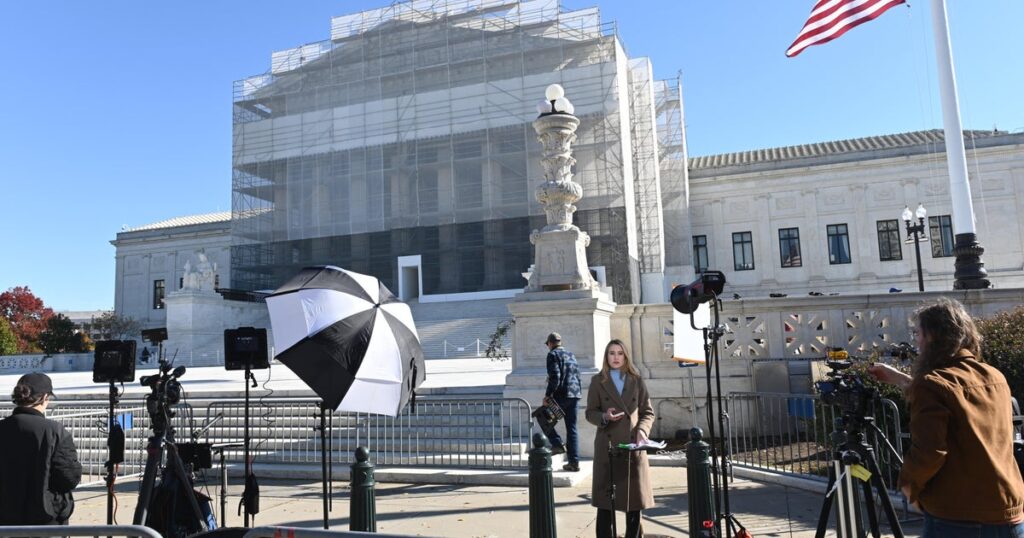Washington — The Supreme Court on Monday declined to take up a legal fight involving a Christian school that wanted to broadcast a pregame prayer over the stadium loudspeaker before a championship football game, turning away a major religious liberty dispute on the heels of a 2022 decision involving prayer in schools.
In rejecting the appeal, the high court will not reconsider a 25-year-old decision that found student-led and initiated prayer at football games unconstitutional. There were no noted dissents.
The legal battle before the justices was brought by a Tampa-based Christian school that wanted to broadcast a brief prayer before a state championship football game through the stadium’s public-address system. But the Florida High School Athletic Association denied the request, which the schools argued violated their rights to free exercise of religion and free speech.
The school, Cambridge Christian, asked the Supreme Court to overturn its 2000 ruling in the case Santa Fe Independent School District v. Doe. In that decision, the court held that the school district’s policy of allowing student-led, student-initiated prayer at football games violated the First Amendment’s Establishment Clause.
But in declining to take up the appeal from the school, that 25-year-old decision will remain in place. Also left intact is a ruling from the U.S. Court of Appeals for the 11th Circuit in favor of the FHSAA, which found that use of the loudspeaker by the Christian schools to engage in communal prayer before a state-organized football game would be government speech.
The dispute dates back to 2015, when Cambridge Christian School and University Christian were set to square off in the Class 2A state championship, played at the Citrus Bowl in Orlando. Ahead of the championship game set for that December, a representative for University Christian asked the state athletics association for permission to say a pregame prayer over the stadium’s loudspeaker.
But the association informed the schools that neither would be allowed to use the public-address system to broadcast a prayer before the game. The then-head of Cambridge Christian re-upped the request to Dr. Roger Dearing, executive director of the Florida athletics group, asking he “allow two Christian schools to honor their Lord before the game and pray” over the loudspeaker.
But Dearing denied the schools’ request, and said he believed federal law prevented him from granting permission to broadcast a pre-game prayer because the Citrus Bowl is a public facility and the FHSAA is a “state actor,” and therefore cannot allow communal prayer. The athletics association instead suggested the two schools come together before the start of the game to pray, which they did.
After the game, Dearing told the schools that he believed that if the athletic association were to allow prayer over the broadcast system, the state could be seen as endorsing or promoting religion in violation of the Establishment Clause. He cited the Supreme Court’s 2000 decision in the dispute involving the Santa Fe Independent School District.
Cambridge Christian sued the FHSAA in 2016, alleging that it had violated its First Amendment rights. A federal district court ruled in favor of the athletics association in March 2022. As to the school’s free speech claims, the trial court found the pregame speech broadcast over the PA system at the state championship game is government speech.
As to the free exercise claims, the court ruled that Cambridge Christian’s religious rights were not violated when it was refused access to the loudspeaker for pregame prayer. The school appealed the decision.
After the district court’s ruling, the Florida legislature enacted a law requiring the FHSAA to allow schools participating in a high school championship contest the chance to make brief opening remarks, if requested, through the public address system.
When the 11th Circuit reviewed the district court’s decision, it agreed that pregame speech over the PA system at a FHSAA football championship game — which takes place at a neutral site — constitutes government speech.
The appeals court also rejected Cambridge Christian’s free exercise claim, finding that the FHSAA was regulating its own expression when it prevented pregame speech over the public-address system at the 2015 championship game.
The school appealed to the Supreme Court, arguing that the athletic association allowed private speech over its loudspeaker but impermissibly censored private religious speech, only because it was religious.
Its lawyers warned in a filing that if the 11th Circuit’s decision were to stand, “state actors will be able to claim that virtually all private speech and religious exercise in a government setting lacks First Amendment protection.”
https://www.cbsnews.com/news/supreme-court-turns-away-pregame-prayer-football-games/


